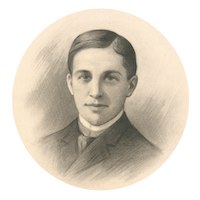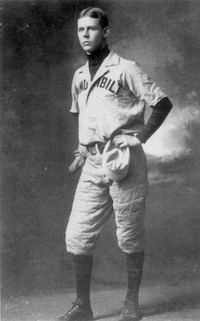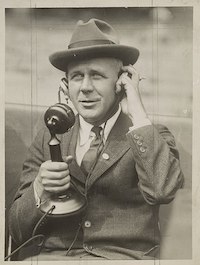Casey at the Bat
Ernest Lawrence Thayer
The outlook wasn't brilliant for the Mudville nine that day; The score stood four to two, with but one inning more to play, And then when Cooney died at first, and Barrows did the same, A pall-like silence fell upon the patrons of the game.
A straggling few got up to go in deep despair. The rest Clung to that hope which springs eternal in the human breast; They thought, "If only Casey could but get a whack at that — We'd put up even money now, with Casey at the bat."
But Flynn preceded Casey, as did also Jimmy Blake, And the former was a hoodoo, while the latter was a cake; So upon that stricken multitude grim melancholy sat; For there seemed but little chance of Casey getting to the bat.
But Flynn let drive a single, to the wonderment of all, And Blake, the much despised, tore the cover off the ball; And when the dust had lifted, and men saw what had occurred, There was Jimmy safe at second and Flynn a-hugging third.
Then from five thousand throats and more there rose a lusty yell; It rumbled through the valley, it rattled in the dell; It pounded on the mountain and recoiled upon the flat, For Casey, mighty Casey, was advancing to the bat.
There was ease in Casey's manner as he stepped into his place; There was pride in Casey's bearing and a smile lit Casey's face. And when, responding to the cheers, he lightly doffed his hat, No stranger in the crowd could doubt 'twas Casey at the bat.
Ten thousand eyes were on him as he rubbed his hands with dirt. Five thousand tongues applauded when he wiped them on his shirt. Then while the writhing pitcher ground the ball into his hip, Defiance flashed in Casey's eye, a sneer curled Casey's lip.
And now the leather-covered sphere came hurtling through the air, And Casey stood a-watching it in haughty grandeur there. Close by the sturdy batsman the ball unheeded sped — "That ain't my style," said Casey. "Strike one!" the umpire said.From the benches, black with people, there went up a muffled roar, Like the beating of the storm-waves on a stern and distant shore; "Kill him! Kill the umpire!" shouted some one on the stand; And it's likely they'd have killed him had not Casey raised his hand.
With a smile of Christian charity great Casey's visage shone; He stilled the rising tumult; he bade the game go on; He signaled to the pitcher, and once more the dun sphere flew; But Casey still ignored it, and the umpire said "Strike two!"
"Fraud!" cried the maddened thousands, and echo answered "Fraud!" But one scornful look from Casey and the audience was awed. They saw his face grow stern and cold, they saw his muscles strain, And they knew that Casey wouldn't let that ball go by again.
The sneer has fled from Casey's lip, the teeth are clenched in hate; He pounds with cruel violence his bat upon the plate. And now the pitcher holds the ball, and now he lets it go, And now the air is shattered by the force of Casey's blow.
Oh, somewhere in this favored land the sun is shining bright, The band is playing somewhere, and somewhere hearts are light, And somewhere men are laughing, and little children shout; But there is no joy in Mudville — mighty Casey has struck out.
About the Poem
No one knows who Thayer modeled Casey after, nor the team. He never told.
As a columnist for the San Francisco Examiner, he would have covered the California League's several teams from San Francisco, Oakland, Sacramento, and Stockton.
Casey was Thayer's final piece at the Examiner. He was 25.
It was popularized by the famous actor, DeWolf Hopper, who performed it an estimated 10,000 times, often to sell-out audiences.

Ernest Lawrence Thayer
About Ernest Lawrence Thayer 1863 - 1940
Ernest Lawrence Thayer graduated Harvard, magna cum laude in Philosophy.
He edited the Lampoon and had been a member of Hasty Pudding.
A friend from both activities, William Randolph Hearst, hired him as humor columnist for the San Francisco Examiner.
After leaving journalism, he supervised his family's mills in Worcester. He and his wife, Rosalind Buel Hammett, retired to Santa Barbara.
Special
I prefer Cyndi's performance to Hopper's.
Casey's Revenge
Grantland Rice
There were saddened hearts in Mudville for a week or even more; There were muttered oaths and curses --every fan in town was sore. "Just think," said one, "how soft it looked with Casey at the bat! And then to think he'd go and spring a bush-league trick like that."
All his past fame was forgotten; he was now a hopeless "shine." They called him "Strike-out Casey" from the mayor down the line, And as he came to bat each day his bosom heaved a sigh, While a look of hopeless fury shone in mighty Casey's eye.
The lane is long, someone has said, that never turns again, And fate, though fickle, often gives another chance to men. And Casey smiled -- his rugged face no longer wore a frown; The pitcher who had started all the trouble came to town.
All Mudville had assembled; ten thousand fans had come To see the twirler who had put big Casey on the bum; And when he stepped into the box, the multitude went wild. He doffed his cap in proud disdain -- but Casey only smiled.
"Play ball!," the umpire's voice rang out, and then the game began; But in that throng of thousands there was not a single fan Who thought that Mudville had a chance; and with the setting sun Their hopes sank low -- the rival team was leading "four to one."
The last half of the ninth came round, with no change in the score; But when the first man up hit safe the crowd began to roar. The din increased, the echo of ten thousand shouts was heard When the pitcher hit the second and gave "four balls" to the third.
Three men on base -- nobody out -- three runs to tie the game! A triple meant the highest niche in Mudville's hall of fame; But here the rally ended and the gloom was deep as night When the fourth one "fouled to catcher" and the fifth "flew out to right."
A dismal groan in chorus came -- a scowl was on each face -- When Casey walked up, bat in hand, and slowly took his place; His bloodshot eyes in fury gleamed; his teeth were clinched in hate; He gave his cap a vicious hook and pounded on the plate.
But fame is fleeting as the wind, and glory fades away; There were no wild and wooly cheers, no glad acclaim this day. They hissed and groaned and hooted as they clamored, "Strike him out!" But Casey gave no outward sign that he had heard this shout.
The pitcher smiled and cut one loose; across the plate it spread; Another hiss, another groan. "Strike one!" the umpire said. Zip! Like a shot, the second curve broke just below his knee-- "Strike two!" the umpire roared aloud; but Casey made no plea.
No roasting for the umpire now -- his was an easy lot; But here the pitcher whirled again -- was that a rifle shot? A whack! a crack! and out through space the leather pellet flew, A blot against the distant sky, a speck against the blue.
Above the fence in center field, in rapid whirling flight, he sphere sailed on; the blot grew dim and then was lost to sight. Ten thousand hats were thrown in air, ten thousand threw a fit, But no one ever found the ball that mighty Casey hit!
Oh, somewhere in this favored land dark clouds may hide the sun. And somewhere bands no longer play and children have no fun; And somewhere over blighted lives there hangs a heavy pall; But Mudville hearts are happy now -- for Casey hit the ball!
About the Poem
Grantland Rice wrote a book of poetry, "Songs of the Stalwart." "Casey's Revenge" was included.

Grantland Rice as a young baseball player

Grantland Rice as a sportscaster
About Grantland Rice
Grantland Rice wrote more than 22,000 sports columns, for over 80 newspapers, making him the "Dean of American Sportswriters" over the first half of the 20th century "Golden Age of Sports."
He married Fannie Katherine Hollis. They had one child.
A close friend to whom he'd entrusted his savings while he was off to war, lost them through poor investments and committed suicide.
Rice blamed himself for presenting "that much temptation" and supported that man's widow throughout his life.
He named the Notre Dame backfield the "Four Horsemen"
The Four Horsemen
Outlined against a blue-gray October sky the Four Horsemen rode again. In dramatic lore they are known as famine, pestilence, destruction and death. These are only aliases. Their real names are: Stuhldreher, Miller, Crowley and Layden. They formed the crest of the South Bend cyclone before which another fighting Army team was swept over the precipice at the Polo Grounds this afternoon as 55,000 spectators peered down upon the bewildering panorama spread out upon the green plain below.
Cyndi is Very Special

